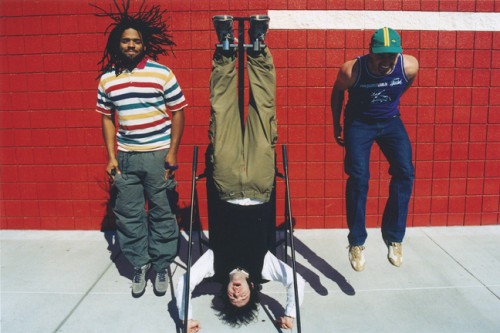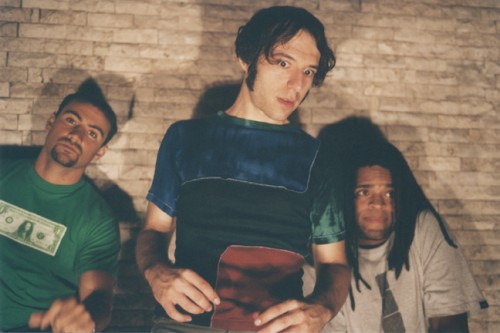The Weather

Hip-Hop Core: Let's talk about The Weather first. What led to the album?
Radioinactive: We'd been talking about doing a project for a long time and we actually attempted to start the project with different people producing the tracks and then Busdriver introduced me to Daedelus and then it sort of just happened.
Busdriver: We hired him, we got a record deal and that was it.
HHC: Is that the reason why your first release as the Weather was a 7" produced by Daddy Kev & Paris Zax a few months prior to the album with Daedelus? You were still looking for different producers…
B: Yeah. We had done a couple of songs with different people and we wanted to release those 2 songs. We also did 'Somethingness' which is on my record and we also did two songs with Anti-MC that never surfaced.
HHC: How did you hook up with Daedelus? Did you know any of his work prior to working with him?
B: I got approached by my friend called Znino who's in that beat group Aim On Contact on Eastern Development. I got approached by him to work on his record "Inventions". So I met him then and I did a song with him called 'Quiet Now'. Just from there, me and Daedelus started working together. I was really impressed with his stuff. He was just really uninhibited and very nice and open. I was really enticed with his whole approach so we hired him for the record.
HHC: What were the recording sessions like considering that the album is totally crazy?
B: I don't know exactly. It happened in different ways. It's a pretty standard approach to what, at least, L.A. rappers like we do. We get a beat and we go home and we work on it. We write something, we come to the studio to record it and, when we edit it, things happen and then we come back and record it more. It just shapes up. The songs may sound very disjointed and very different from each other but we have a similar work ethic we apply to each one.
R: Also, there's a bunch of songs on the Weather where we were doing the vocals simultaneously and we actually wrote a lot of those songs together, which was fun for me because it's a change. We were interacting and actually coming up with the concepts of the songs and the back-and-forth stuff. That was something different from me on this album.

HHC: Many people (us included) consider The Weather as the best album of 2003. A few months down the line, how do you feel about this album?
R: I think it was really fun working with Daedelus. He's not a hip-hop producer and he wasn't scared to be creative and to push the envelope in a different way than the people that I've worked with in the past. The tracks that he came up with were really challenging for us (at least for me): the meter of the stuff, etc… It's not your regular "boom-bap-boom-bap". So that's really cool. I think it's good to step out of your comfort zone to go somewhere else. And we didn't have a diagram of what we were doing and where we were going, we were just sort of doing it and it was great.
HHC: Even if you work with concepts, free association writing definitely plays a big part in your lyrics, particularly on The Weather project. What attracts you to that writing process?
R: For me, within the combination of free association, you have certain feelings and ideas that when linked together it becomes some sort of code. So you're hearing, you're listening and it's very condensed and you're hearing all these different ideas, very visual pictures, all combined together. I think there's a lot of wisdom in humour. You're taking these very different ideas and putting them together and somehow making them all related… like the interconnectedness of everything. Whether you're talking about the six degrees of separation… Like you can take two completely different things and throw them together and interesting accidents happen. That's the fun of hip-hop. There's no boundaries in anything.
B: For me, it's just all about the mastery of the medium of trying to convey interesting thoughts and ideas. I don't consider a lot of what I do or even what Radio does to be free association; it's just that the writing has a certain stylistic approach that's not as didactic as most hip-hop artists. It's just our background. A lot of LA underground early nineties stuff just had a very honest, astute approach. Me, I'm a product of that so I just continue on. It's not a big issue. I just like the writing. Not necessarily free association, just trying to write and make it as interesting as possible.
HHC: Your lyrics often contain inside jokes. Your flow is often very playful. Humour seems to be very important to you, isn't it?
B: Yeah. Hip-hop was a big party actually (laughs).
R: I guess that a lot of people take themselves differently. Some people are humorous and I don't think that there's only one way to do it. There's just different ways to express yourself. It's a lot easier to do the type of stuff that we do and to have a carefree attitude that sort of comes across. Talking about the environment we come from, in LA, if you decide that you're gonna be a battle emcee for instance then you're really gonna get a lot of battles out of it and you're gonna lose a lot and it's a difficult road… So, for me, I just created this whole world of rhyming that wasn't centred around "Yo, I'm the best" and whatever because there's a lot of really talented artists from Los Angeles in that niche. I just created that other tangent that was talking about other stuff than battling emcees or gangsta stuff because I wasn't about that.

HHC: Speaking about the LA school of emceeing, Los Angeles is really creative, has a lot of different styles and is going in a lot of different directions flow-wise. Flows seem to take a central part in the west coast scene whereas in the rest of the hip-hop world everyone seems to be stuck in a certain mould. Why is that in your opinion?
B: I don't know. I think California is a unique place. We're more allowed to explore for some reason. Artists are less inhibited. I don't think that there's as much environmental pressure as there is in New York City or in New Jersey . It's just different. I can only speak for LA but I always felt allowed to go different directions.
R: I think part of it is the way that LA is set up. I think you can find some sort of parallel to the LA jazz scene. In New York , you have everyone just packed so close together and everyday you're dealing with everyone and I think it really affects the influence. There's a lot of people in LA but it's really spread out and you're more allowed to be in your own world… and the weather's good. In NYC, if you're locked into the train and you have a hundred emcees rapping all the same, you're gonna be influenced by that.
B: People are always confused with how the gangsta scene and the underground hip-hop scene coincided and blossomed at the same time. That strikes people as being extremely strange but it makes perfect sense if you're from LA. It's not even a stretch: the Fellowship and all the Goodlifers and NWA… It makes sense for them to exist, even within the same relatively close part of town, and to be going separate ways. Just 'cause LA sort of allows it.
R: But then, if you go to LA, this LA scene that you're talking about is very very small on the scale of LA. If you take most of the people who are doing music in LA, it's not gonna sound like the stuff that we're doing.
HHC: I know that you've recently done a track with TTC but I've also heard rumours that a more elaborate project is in the works. Could you confirm that and tell us more about it?
R: Wow… We definitely have a song with them for their new Big Dada release. As far as everything else, you want to keep it draped in a cloud of mystery (laughs). We're not sure about it yet.

HHC: How has the tour with TTC been so far?
B: It's overwhelming. The kind of excessful joy that I get from watching French people freak out to our stuff. It's been really positive. I'm just happy to see that in any show and any place we were welcome to perform people care and show up on our material. It's really flattering. It's good. It gives me hope for the rest of the year.
R: I think it's a good plateau to introduce different types of music and make it international. It brings people together from different places. It's good for us; it's good for them. We get introduced to their fans and hopefully they'll get introduced to ours.
B: I think the TTC crowd really has an optimal audience out here. I'm glad to be here with them.
HHC: How do you feel about being more popular in Europe than in the States?
B: So… it's officially true!
R (laughing): We were wondering about that.
B: That's crazy because we were kinda fighting and thinking as to that was actually true and you've kinda confirmed that. It's great 'cause it makes me feel like Europe is this alternate world in which we actually count and matter.
R: Then, you start to realize why so many Americans, like the jazz world or whatever, moved over here. It seems like just a much more metropolitan place. People are much more involved in arts or whatever. It's great. It's just great to be here and be doing this.
B: It's crazy how, even on a government level, European countries are. They embrace and supplement the needs of the artists during downtime. It's unheard of in the States. It makes sense why people would talk more about us here. It's just fantastic.
Interview by Cobalt & MelloW
May 2004